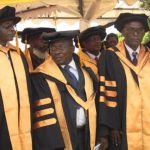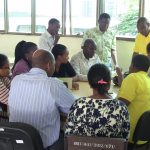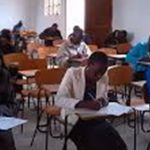Bachelor of Education in Special Education (BED SE)
The programme aims at providing theoretical, philosophical, historical, and practical learning experiences in special education. A key characteristic of a student completing the programme will be knowledgeable and professional with abilities in providing support and services to people with special needs and disabilities. The distinguishing features of this programme are capacity building in educational services for people with disabilities and special educational needs. Training and producing teachers capable of both rendering the necessary support to learners with special needs and disabilities and teaching in the classroom.
Programme Summary
Programme Summary
Course Name: Bachelor of Education in Special Education
Short Form: BED SE
Programme: Special Education
UQF level:UQF Level 8 Academic bachelor’s Degree
Duration:3 year
Total Units: 40 Units
Mode of Delivery: Blended Mode
Programme Informations
Entry requirements
The entry qualifications to this Certificate in Early Childhood Care and Education s programme of the Open University of Tanzania [OUT] are:
OPTION I
A Certificate of Education (Ordinary Level) or equivalent, with passes in FOUR approved subjects, obtained prior to the sitting of the Advanced Certificate of Secondary Education Examination (A.C.S.E.E.) or equivalent.
and
(b) One of the following combinations of passes in Advanced Certificate of Secondary Education Examination (A.C.S.E.E.) or equivalent;
Either
(i) Two principal Level passes (in appropriate subjects) or
(ii) An appropriate equivalent Diploma approved by the Senate of The Open University of Tanzania. These may include. The diploma must be of a duration of at least two years
OPTION II
Candidates who have satisfied Examiners in the Mature Age Entry Examinations set by Sokoine University of Agriculture (SUA), University of Dar Es Salaam, or any other recognized university will be considered for admission. Written evidence of a satisfactory pass will be essential.
OPTION III
Candidates who do not qualify under options I and II may register for Foundation Courses (OFC) offered by The Open University of Tanzania. Those who pass examinations set at the end of the coursewill beeligibleforregistration for any of the degree programmes including Bachelor of Education in Special Education (BED-SE), depending on the subject combination taken in the OFC.
OPTION IV
Candidates with awards from other Institutions of Higher Learning will be considered on their merit. These include a degree or an Advanced Diploma in a relevant field.
OPTION V
Either a candidate must possess a diploma with at least 3.0 GPA or ‘C’ average grade in specified fields such as: Diploma in special education; Diploma in education; Diploma in primary teacher education; Diploma in early childhood education; Diploma in technical education; Diploma in educational management and administration; Diploma in open and distance learning; Diploma in curriculum design and development; Diploma in business education; Diploma in ICT; Diploma in computer science; Diploma in languages; Diploma in Guidance and Counseling; Diploma in community development; Diploma in social work; Diploma in Assistive Technology; Diploma in audiology; Diploma in Physiotherapy; Diploma in Sign Language; Diploma in Adult Education; Diploma in Rehabilitation studies; Diploma in Hearing Sciences and Audiology; PLUS additional entry qualifications for those without a diploma in special education: (1) a training in special education or (2) a training in disability issues or (3) experience in services for people with disabilities.
LEVEL 1
COURSE CODE | COURSE NAME | Status | Credits |
OFP 100 | Introduction to computer | Core | 10 |
OFC 017 | Communication Skills | Core | 10 |
OEP 101 | Educational Psychology | Core | 20 |
OEF 101 | Philosophy of Education and Teaching | Core | 20 |
OEF 102 | History and Sociological Aspects in Education | Core | 20 |
OEI 101 | Curriculum Development and Evaluation | Core | 20 |
| Courses from 2 Teaching Subject | Core | 60 |
Level 2
COURSE CODE AND NAME | Status | Credits |
OEP 301 History and Issues in Special Education | Core | 20 |
OEI 208 Teaching Practice A | Core | 10 |
OEI 230 Chemistry Teaching Methods | Elective | 10 |
OEI 231 Physics Teaching Methods | Elective | 10 |
OEI 232 Biology Teaching Methods | Elective | 10 |
OEI 234 History Teaching Methods | Elective | 10 |
OEI 235 Geography Teaching Methods | Elective | 10 |
OEI 236 Religious Studies Teaching Methods | Elective | 10 |
OEI 237 Civics/ General Studies Teaching Methods | Elective | 10 |
OEI 238 English Teaching Methods | Elective | 10 |
OEI 239 Literature in English Teaching Methods | Elective | 10 |
OEI 240 Kiswahili Teaching Methods | Elective | 10 |
OEI 241 Business Studies Teaching Methods | Elective | 10 |
OEI 242 Economics Teaching Methods | Elective | 10 |
OEI 243 Home Economics Teaching Methods | Elective | 10 |
OEI 244 Mathematics Teaching Methods | Elective | 10 |
OEI 245 ICT Teaching Methods | Elective | 10 |
Courses from 2 T2eaching Subjects |
| 60 |
Level 3
COURSE CODE AND NAME | Status | Credits |
OEP 302 Special Education Services and Provisions | Core | 10 |
OEP 303 Inclusive Education | Core | 10 |
OEP 304 Management of Special Education | Core | 10 |
OEI 306Transition Strategies in Special Education | Core | 10 |
OEF 301: Comparative and Cross Cutting Issues in Education | Elective | 10 |
OEI 208B Teaching Practice B | Core | 10 |
Courses from 2 Teaching Subjects |
| 60 |
Fee Structure
- General Fees for Non-Degree Programmes
No. | Item | Local (Tshs.) | EAC/SADC (USD) | Non-SADC/EAC (USD) |
1. | Registration Fees | 30,000 | 30 | 30 |
2. | Examination fees paid per paper (Test& Exam) | 10,000 | 20 | 40 |
3. | Student Organization fees (annually) | 20,000 | 20 | 20 |
4. | Student Identity card | 20,000 | 20 | 20 |
5. | Quality Assurance Fee (annually) | 20,000 | 20 | 40 |
- Tuition Fees per Unit (or per 10 credits) For Bachelor Degree courses
No. | Item | Local (Tshs.) | EAC/SADC (USD) | Non-SADC/EAC (USD) |
1. | Theoretical course by distance mode | 60,000 | 40 | 80 |
2. | Theoretical Course by Face to face | 90,000 | 60 | 120 |
3. | Field Practice | 100,000 | 70 | 140 |
4. | Teaching practice | 100,000 | 70 | 140 |
5. | Science Laboratory | 150,000 | 100 | 240 |
6. | Project/ Dissertation | 100,000 | 70 | 140 |
| NAME | CONTACTS |
Elizabeth Bhalalusesa | Email:elizabeth.bhalalusesa@out.ac.tz |
PROGRAM EXPECTED LEARNING OUTCOMES (Competences)
This programme provides opportunities for students to develop and demonstrate knowledge and understanding, skills, qualities, and other attributes in the following areas:
Knowledge and Understanding
On completing the programme students can be expected to:
A1 have a strong understanding of special education, learners with disabilities and their special educational needs as well as the various ways of facilitating their learning
A2 have developed a positive understanding and accumulated knowledge in the methods, and approaches to manage special education
A3 be able to demonstrate an understanding of learning needs for children with special needs/disabilities in any educational setting
A4 have an understanding of how special education is related to general education and how they can be used in educating the community, the public, resources, and other special education personnel to ensure equality in education for disabled children
A5 have developed knowledge and understanding of research and evaluation in the field of special education.
Intellectual Skills
On completing the programme students can be expected to have the ability to:
B1 identify, simplify, and apply special education principles in analysing and modelling of learning environment for people with disabilities and those with special needs;
B2 identify and apply appropriate teaching/ learning methods for people with disabilities andthose with educational special needs;
B3 identify and apply appropriate identification, screening, assessment, and early intervention methods and strategies;
B4 identify and apply appropriate research and evaluation method in special education
B5 identify and apply principles and skills of guidance and counseling in fostering access and equalisation of opportunities.
B6 identify and apply planning and managerial skills in an inclusive educational setting.
Professional/ Practical Skills
On completing the programme students can be expected to have the ability to:
C1 use a range of specific types of teaching methods and support strategies to stimulate and strengthen the use of abilities of people with disabilities and those with educational special needs;
C2 effectively use assistive devices and technologies for people with disabilities and those with
educational special needs;
C3 effectively use of research and evaluation skills in special education;
C4 write and plan services and lessons for people with disabilities and those with educational
special needs;
C5 write and plan tasks meant to bridge gaps in the learning of people with disabilities and
those with special needs;
C6 use a range of strategies, methods and skills of identification, screening, assessment and
early intervention.
Transferable/Key Skills
On completing the programme students can be expected to have the ability to:
D1 Producing engaging written and audio-visual resources;
D2 plan, carry out, and report on an individual research project;
D3 manage time and work to deadlines and reflexivity, which incorporates flexibility;
D4 Presentation and communication skills
D5 Evaluation and decision making based on standardized criteria
D6 facilitating participation/participate constructively in groups/ Simultaneous independent and collaborative working
- Each module carries 100% marks. The final examination counts for 70% of the total marks. Coursework carries 30% of the total marks
- A candidate shall not pass the course programme unless he/she attains a minimum of 40% (C) in each module.
- The mode of evaluation for the field practice/ teaching practice is 100%



